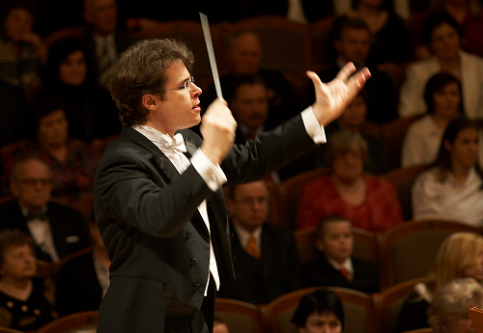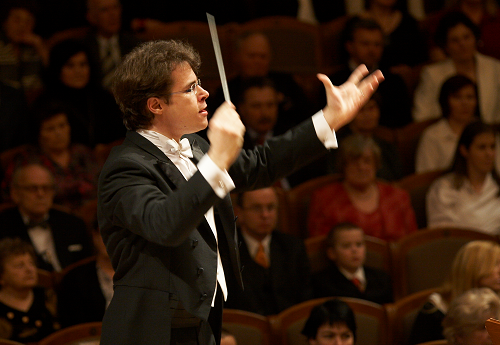 United Kingdom Schubert, Mendelssohn, Brahms: Karen Gomyo (violin), Philharmonia Orchestra / Jakub Hrůša (conductor). Royal Festival Hall, London, 16.5.2019. (CC)
United Kingdom Schubert, Mendelssohn, Brahms: Karen Gomyo (violin), Philharmonia Orchestra / Jakub Hrůša (conductor). Royal Festival Hall, London, 16.5.2019. (CC)

Schubert – Symphony No.8 in B minor, D759, ‘Unfinished’
Mendelssohn – Violin Concerto in E minor, Op. 64
Brahms – Symphony No.3 in F, Op. 90
Pre-Concert: Philharmonia Chamber Players (Rebecca Chan, Eugene Lee [violins], William Bender [viola], Ella Rundle [cello])
Schubert – String Quartet No.12 in C minor, D703, ‘Quartettsatz’
Mendelssohn – String Quartet No.6 in F minor, Op.80
Co-Principal Guest Conductor of the Philharmonia, Jakub Hrůša, offered a programme of decidedly centralist fare; but this was a far from run-of-the-mill evening. In an interview printed in the booklet, Hruša speaks of his love for the Austro-Germanic repertoire, and how that meshes with his post as Chief Conductor of the Bamberg Symphony (balancing that, he has performed much Czech music in the past with the Philharmonia). Now we in London get a chance to savour his way with core repertoire.
The Schubert ‘Unfinished’ was a splendidly considered performance, tempi flowing so the structure of the movements came to the fore (both exposition repeats were observed in the two symphonies this evening). The sheer eloquence of the second subject of Schubert’s first movement was beautiful; but most impressive was the sense of organic growth in the development section – not quite as effective as the great Günter Wand here – a Royal Festival Hall performance in the 1980s with the BBC Symphony Orchestra, coupled with Schubert’s Ninth, will never be erased – but satisfyingly dramatic, nonetheless. There were some fabulous woodwind contributions, not least the solo clarinet of Carlos Ferreria, or in the use of a woodwind choir in the second movement. A lovely account.
The Mendelssohn E minor Concerto featured the Tokyo-born, Berlin-based Karen Gomyo, making her Philharmonia debut. Gomyo’s sound is forthright but can be piercing in the upper registers; but, once settled, she was certainly not short on drama. A nervous energy informed the tensile first movement, leading to a fantastical, imaginative way with the cadenza. Although there was a sense of wonder in the central Andante, a touch more warmth of tone might have sealed the deal. The finale, a Presto rather than an Allegro molto vivace, held moments of beauty – violin cantabile set against scampering strings – the orchestra here, as elsewhere, completely with the soloist to the last millisecond, testament to Hrůša’s talents as an accompanist. No encore, but this was a positive debut from a clearly imaginative musician.
Brahms’s Third Symphony was given in burnished, full sound, eight double-basses to the conductor’s left grounding the upper registers, antiphonal violins working splendidly, allowing Brahms’s lines to be impeccably delineated.
The first movement, mobile again but here with a decided undercurrent of angst, was most impressive for its variegated nature, harmonic darkenings adding colour. The central movements, well-paced – the third identifiably allegretto, the second with more clarinet gold – offered respite before a volatile finale added sudden emotive power.
At 6pm, there had been a chamber concert of works by Schubert and Mendelssohn performed by the Philharmonia Chamber Players. How wonderful to see these events honoured in the main concert programme booklet itself, too, with full notes and details. The string quartet, taken from members of the orchestra, gave a dramatic Schubert Quartettsatz (with some superb phrasing from first violin Rebecca Chan) before a simply fabulous Mendelssohn F minor Quartet. This piece, Mendelssohn’s Sixth Quartet, was written in response to the death of his sister, Fanny, and is one of his most profound offerings. One could hear links to Schubert’s ‘Unfinished’, perhaps, in the tremolandi of the first movement, but it was in the lovely sighing gestures of the Adagio that the performance really shot through to the heart. The quartet’s sound was beautifully blended – so important in Mendelssohn, particularly in the Adagio. The disquiet of the piece, still evident in the finale, resonated on way after the performance finished. Far more than an adjunct to a main event, this felt an integral part of the evening. Bravo.
Colin Clarke
For more about the Philharmonia click here.
